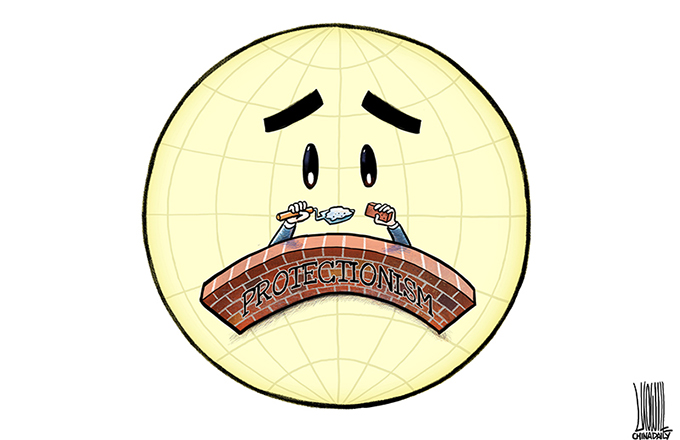Changing energy outlook
US' development and commercialization of shale gas will have a big impact on the global economy and geopolitics
The United States announced in this year's annual energy outlook that it will become a net exporter of natural gas by the year 2020 instead of the previously projected 2022.
The US leads the rest of the world in the development of shale gas technology. Last April, the Federal Energy Regulatory Commission approved a proposal by an American liquefied natural gas energy company to export liquefied natural gas abroad. The approval, the first of its kind in 40 years, was a landmark for the shale gas revolution in the US, signaling that the country has transformed itself from an importer of energy to a major exporter.
A major change in energy structure often triggers a new round of economic development. For the US, shale gas exploration will help pull its manufacturing out of recession and give a strong boost to the country's economic recovery.
Shale gas is expected to become a major energy source for the world, and the US-initiated shale gas revolution means the US will not only have a more dominant position in the global energy distribution, it will also change the world's geopolitical layout. So there is a great deal of attention on how the US will adjust its global strategy, especially its Middle East policy, and what kind of a situation other energy-consuming nations will face in terms of energy security.
In 2012, the Middle East witnessed complicated changes, as regimes changed and chaos spread from country to country. The region's political landscape changed as tussles between major powers intensified and religious forces took the opportunity to extend their influence. The unrest has fundamentally changed the region's political eco-system and brought drastic impact to the international patterns.
As a diplomat with more than 40 years experience in the Middle East, I believe the region is entering a period of continuous unrest. Seeking changes amid unrest and hoping for stability will be the main characteristics of this period. With the spreading influence of the "Arab Spring" that originated in Tunisia and Egypt in 2010, regional unrest has been intensified by power struggles between various forces within and outside the region. Balancing the region's internal conflicts and enhancing local people's ability to handle regional affairs on their own are urgently needed to promote stability and healthy development.
In particular, the Gulf area, which has remained insulated from the unrest, deserves attention. Since the Arab Spring began, the Cooperation Council for the Arab States of the Gulf has paid close attention to the regional issues that matter to the six Gulf states and worked to stabilize the region. These efforts have raised the position of the Gulf countries in the Arab world in terms of politics, foreign diplomacy, security and economy.
Like Central Asia, Russia and Africa, the Gulf region is an important supplier of oil. During the beginning of the Arab Spring, Gulf countries maintained a high level of petroleum production, playing a vital role in keeping a balanced, global supply of energy while stabilizing the price of oil.
However, as unrest in the Middle East continues and US shale gas technologies become commercialized, the global landscape of energy resources will change and the US will become less and less reliant on Middle Eastern oil, until this reliance finally ends. The development of shale gas will have an insurmountable impact on the Middle East, the global economy and the world's geopolitical map.
In the future, global energy supply will become multi-sourced. With the exploitation of shale gas and other new sources of energy, the balance of energy resources will definitely shift. This change will matter most to China and the US, the world's largest and second-largest consumers of energy. China is working to establish a new type of power relationship with other major powers based upon the idea of cooperation and mutual trust. Fostering cooperation while exploring shale gas and other energy resources is of vital importance to the US and China. Maintaining peace and stability in the Middle East is also a common interest of both countries. There is a great deal both countries can achieve through cooperation, which will help bring about the balanced development of the world economy and global geopolitical stability.
The author is a member on the Foreign Affairs Committee of the Chinese People's Political Consultative Conference. www.chinausfocus.com
(China Daily 02/18/2013 page8)




















